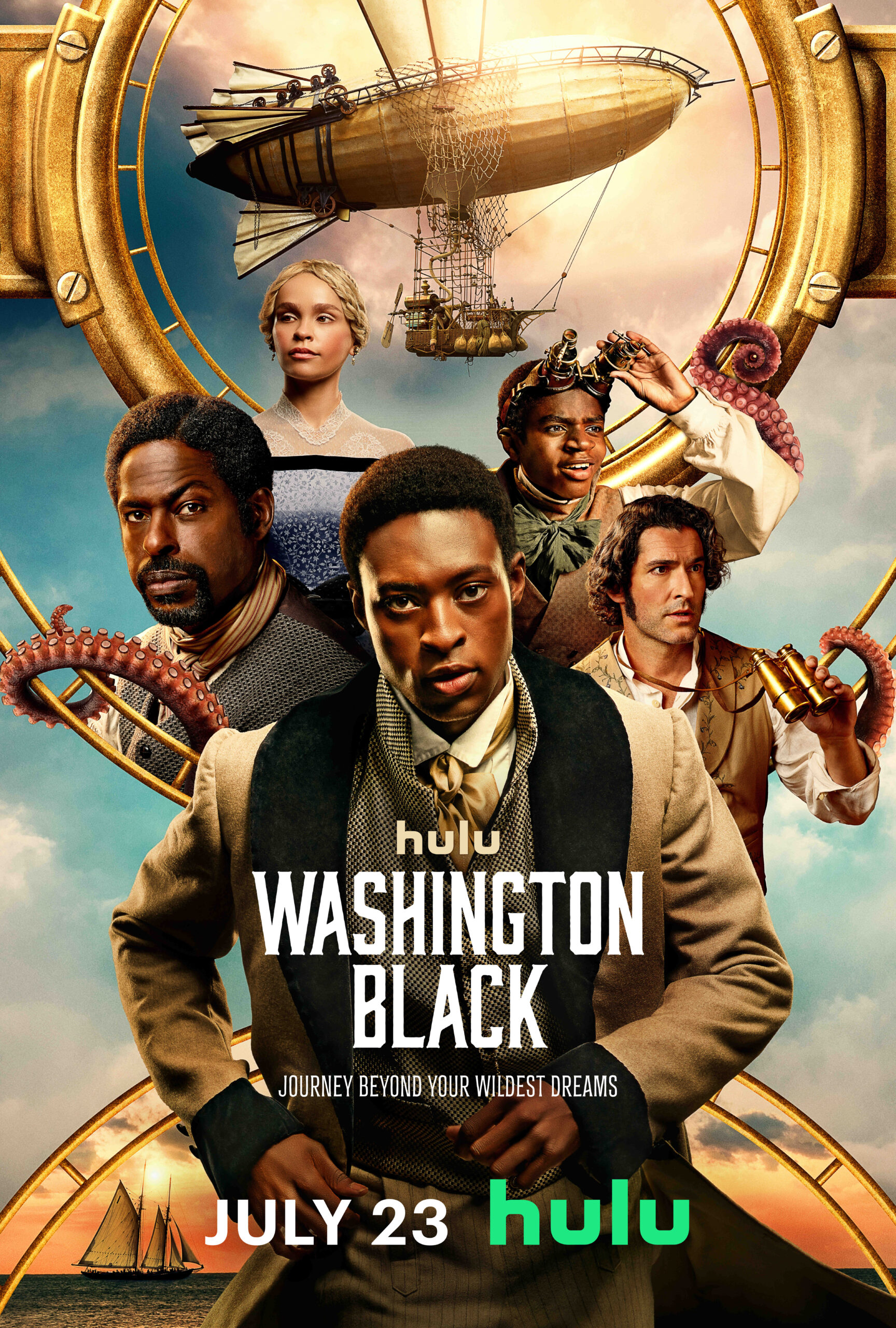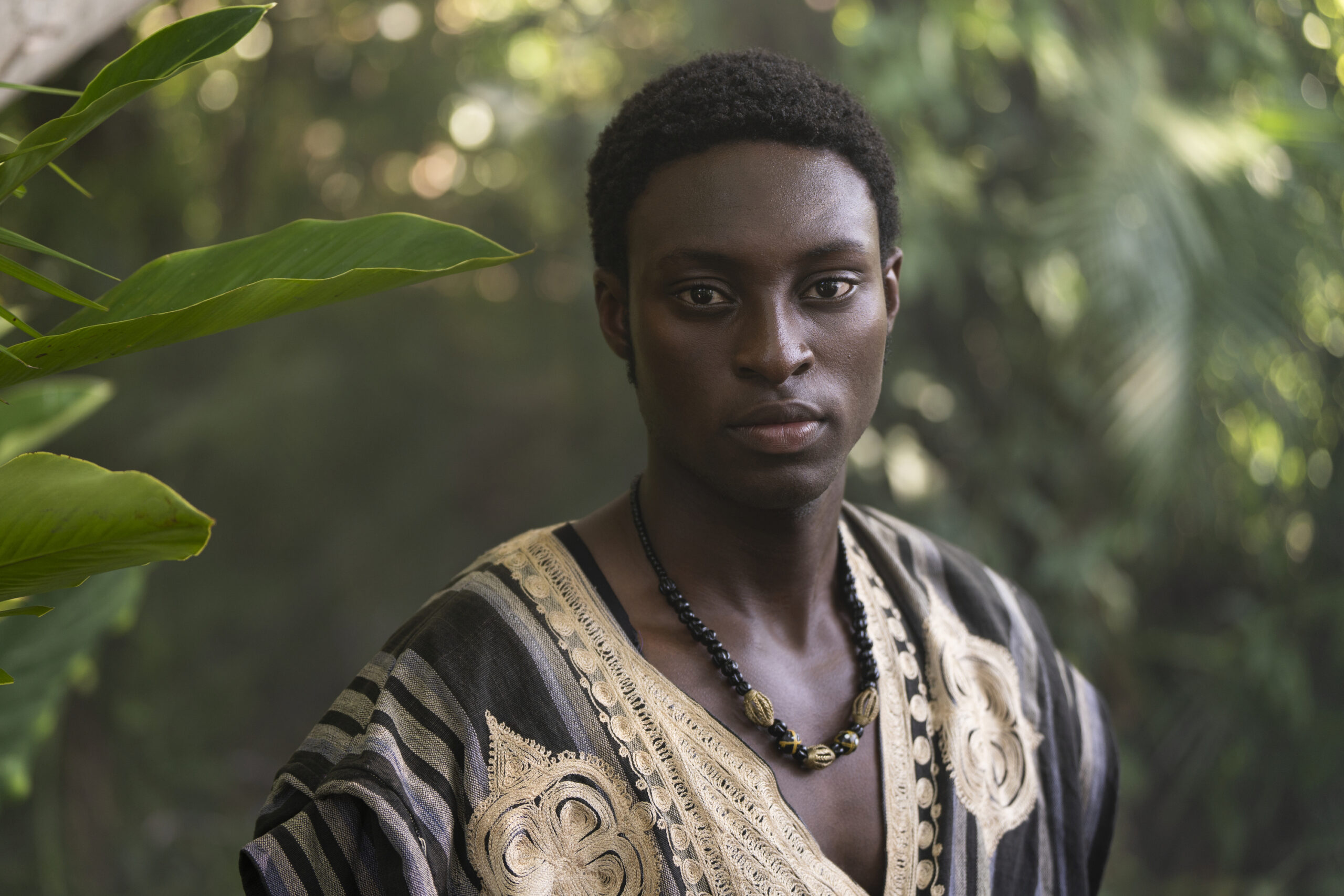Hulu’s “Washington Black” is a sweeping, globe-trotting adventure in the spirit of Jules Verne’s science-fiction marvels and the haunting depth of Toni Morrison’s Beloved, following a brilliant young boy’s escape from a Barbados plantation into a world of invention, peril, and hope. With Ernest Kingsley Jr. leading a stellar cast, the series transforms a harrowing flight from retaliation into a visually lush quest for identity and freedom, blending historical drama with the heart and wonder of a coming-of-age epic. Based on the acclaimed novel Esi Edugyan and shaped by a fascination with historical records, science, and poetic literature centered on the search for belonging, “Washington Black” reimagines the terrors of enslavement as the backdrop for an epic journey and a hero’s tale.
When asked about the influences on the novel, Edugyan told The Booker Prize website:
“Washington Black came out of a strange confluence of interests–a fascination with a Victorian-era criminal trial centering around the disappearance and supposed resurrection of the wealthy scion Roger Tichborne; an interest in 19th-century scientific conventions, especially the cataloguing and depiction of marine creatures; the realities of plantation life in Barbados; the classic bildungsroman journey from innocence to experience. The research could have gone on forever…”
The series is an eight-episode saga, in which a young inventor named George Washington “Wash” Black (Ernest Kingsley Jr.) finds his way from the clutches of enslavement into a free life in Nova Scotia. But because he is brilliant, old ties refuse to let him go. This premise sets the stage for a story that is as much about invention and adventure as it is about freedom and the bonds that shape us.

Wash’s journey is paralleled by that of Tanna Goff (Iola Evans), a young woman of means who is passing for white. An interesting point is that the casting directors for “Washington Black” were in search of a leading actress who could convincingly play the role, and they found one who truly could in Evans; and the costumers give her a look that quietly says IYKYK (if you know, you know), adding subtle layers to her character’s duality.
Wash and Tanna meet early on, both having to skate to Nova Scotia to evade persecution—he as a formerly enslaved person, and she as a young woman hiding her Black heritage. Their parallel is reflected in the storytelling. First, we meet Wash with Sterling K. Brown’s Medwin, and we get much of his backstory as an islander and an inventor. Then we meet Tanna as her ship arrives, and they briefly meet on the docks. Wash mistakes her for a servant, not realizing she is, in fact, a young woman of means. She is not insulted, which is a high point in favor of her character, and he is charmed by her lack of offense.
Tanna’s father, Mr. Goff (Rupert Graves), has erased every bit of her mother from her life, seemingly hoping to sever her connection to the Black part of herself and the family that still lives in the Solomon Islands. This tension between identity and erasure is one of the many threads that enrich the series.
“You have to keep it alive to see the truth of it.”

It’s not long before we journey back to Barbados, eight years prior, with Young Wash (Eddie Karanja), and we begin to see the story that brought him to Canada—a past that is still hot on his heels. This is where we meet his guardian, Big Kit (Shaunette Renée Wilson), an enslaved woman from Dahomey, and Christopher “Titch” Wilde (Tom Ellis), another scientist but also the son of the family who runs the plantation. Titch has built a steam engine, and Wash is enchanted by it. The scion fancies himself an abolitionist, but as his brother points out, there’s some hypocrisy there.
The series moves forward and back through time, from Nova Scotia’s now to Barbados’ then, to piece together the story as it’s happening. This structure allows the audience to understand the weight of Wash’s past while rooting for his future.
“Washington Black” revels in its steampunk elements, with steam-fueled dirigibles (airships) and vehicles that are fully operational decades before such inventions existed in our world. The showrunners, Selwyn Seyfu Hinds and Kimberly Ann Harrison, bring a keen sense of place and character to the series. The costuming and production design have a jauntiness that sharpens the sense of historical science fiction, but with a light touch. And there’s a sweet “Kiss the Girl” type of scene that features aquatic bioluminescence, an example of the whimsy added to the story’s visual palette.
When we eventually take to the high seas, we meet a pirate crew, and it’s good fun with consequences for Wash and the story. Strangely, this section of the adventure reminds me of “Stardust” (2007), although the risks are less fairytale and more trials of an epic hero. Barrington (Miles Yikenni) and Theodora (Sundra Oakley) are standouts here, but it’s also a pleasure to see Kamar de Los Reyes as Captain Alvarez. I thought “Daredevil: Born Again” was his final performance, and to see him portray another complicated and emotionally conflicted character is a nice tribute.

“Man don’t get what he deserves, he gets what he negotiates.”
At its heart, “Washington Black” is fueled by every type of love—and every love when it curdles. There is parental protection from Big Kit to Wash and its mirror with Mr. Goff and Tanna; brotherly jealousy between the Wilde brothers; the relationship between the mentor and their apprentice, like with Titch and Wash; the recklessness of first love; the disappointment in a leader who is no longer objective; and the sweetness of found family between Wash, Medwin, and Angie (Sharon Duncan-Brewster). The relationships are all rich, complex, and rife with the possibility of betrayal—or its opposite, a loyalty that supersedes everything else.
Although I’m a lover of the fantastical, and how richly this story is painted with steampunk elements and historical strife, bordering on speculative, it’s the relationships that kept me and made me curious about what the next turn would bring.
So much happens in the first four episodes that when we get to the cliffhanger at the end of the fourth, it’s hard to believe we’re only halfway there. This is when we realize Edward Bluemel’s William McGee, the owner of the local docks, isn’t the gentleman and art lover we thought he was. Whether that’s good for the Goffs and Wash remains unknown—isn’t that a thrill?
Although “Washington Black” is more steampunk than magic, it’s a poetic epic along the lines of “The Odyssey,” “Journey to the West,” and “The Epic of Sundiata.” Washington Black himself is a hero for the ages, with infusions from true-life legends like explorer Matthew Henson and inventor George Washington Carver. The series flies the flags of incredible deeds, fantastical adventures, and transformation through travel, while calling the cultural norms of an era into question. Like the novel, the Hulu series is a bildungsroman—a coming-of-age story focusing on an extraordinary young person amid spiritual evolution—following Wash through ordeals of love, self-discovery, betrayal, and friendship.
“He’s the one [who taught] me to swim.”
“Washington Black” is a wonderment, combining the harshness of history and the fuel of steampunk with the many sides of love, into the tale of a lionhearted legend. It’s also a specific kind of lovely—a story that doesn’t hide from the truth of the past and yet finds space to tell a story that holds an intrinsic sense of wonder and possibility within the idea that these characters could find a place to be their entire selves. “Washington Black” is the story of a boy genius in a world that is parallel to ours and yet just different enough to make us feel like anything is possible, even in a past we already know the outcome of. And that makes it well worth the ride around a treacherous but spectacular world.
“Washington Black” premieres July 23 (all at once) on Hulu in the U.S. and Disney+ internationally
Four episodes were provided for review.
from Roger Ebert https://ift.tt/sBZNpcJ

.png)
.png)

